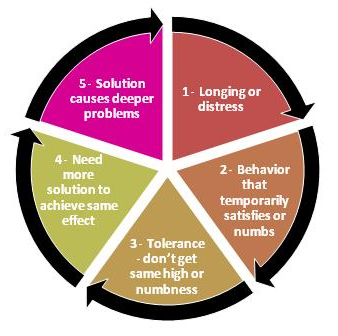Cynthia Heimel was a writer who lived in New York in the 70’s. She knew actors and artists before they became famous, while they were still bussing tables and driving cabs. But she also knew them after their rise to celebrity status.

She wrote:
I pity celebrities. No, I really do. Sylvester Stallone, Bruce Willis, and Barbara Streisand were once perfectly pleasant human beings. But now their wrath is awful. I think when God wants to play a really rotten practical joke on you, he grants you your deepest wish and giggles merrily when you realize you want to kill yourself.
You see, Sly, Bruce and Barbara wanted fame. They worked, they pushed, and the morning after each of them became famous, they wanted to take an overdose. Because that giant thing they were striving for, that something that was going to make everything okay, that was going to make their lives bearable, that was going to provide them with personal fulfillment and happiness, had happened.
And they were still them. The disillusionment turned them howling and insufferable.
Cynthia Heimel, The Village Voice, January 2, 1990
When Heimel says that their “disillusionment turned them howling and insufferable,” she drives a dagger into the center of every human heart. We are so desperate for so many things, and she says their fulfillment will leave us empty and grasping.
The western world is experiencing an explosion of devastating addictions. We’ve all witnessed the destruction of families, lives, and careers—all on account of these chemical and seemingly unconquerable obsessions.
But there are other hidden addictions inside each of us, you and me (let’s be honest for a moment), that these chemical dependencies point to.
The Nature of Addiction
Addiction has a simple cycle, and that cycle uncovers our deepest issues—the problems beneath our problems. This pattern follows five steps:
- First: we have some deep longing or distress. (It could come from a childhood wound, a greedy need for validation, or from some sense of emptiness.)
- Second: we turn to a behavior (or substance) to bring temporary satisfaction or simply to numb the pain.
- Third: that behavior (or substance) no longer satisfies. This is called the tolerance effect.
- Fourth: we increase our dosage of the behavior (or substance) in an attempt to recapture that initial, wonderful feeling.
- Finally: the behavior (or substance) itself magnifies the very problem we try to avoid. So we go deeper and deeper into our counterfeit solutions.
The downward spiral presents itself most clearly in the classic addictions of substance (alcohol or drugs), sex, and gambling:
- The alcoholic loses his job after coming to work drunk, again.
- The sex-addict sees the police drive up his driveway, and he knows exactly why.
- The gambler loses his family, his home, and retirement, and then bets the loan from his son (to pay for his monthly rent) on the Super Bowl.
However, these seemingly “extreme” external illustrations mask the subtle, damaging, and “secret” addictions that control the lives of you and me. The classic addiction examples I used above are real stories of destroyed lives of men that I know personally. But so are these:
- A man crying over lunch on this thirtieth birthday because he wasn’t a ten millionaire (only six!), so he drove himself harder, estranging his wife and children (all away at boarding school) and employees.
- A woman crying to me how her eldest son wasn’t following the Lord they way she thought he should—despite her “child-rearing was biblically perfect”—so she drove her other children harder, until they too couldn’t wait to leave home.
- A successful Christian writer whose latest book failed to sell as well as his previous books, and in his determination to make his sequel a roaring success, he alienated his best friends.
- A leader of a worldwide Christian movement restructured the organization to put himself solely at the top. When a long-term partner questioned the power play, that partner is ostracized. Twenty years later, that senior pastor refuses reconciliation despite hundreds of requests, because he “heard from Jesus.”
Tim Keller describes our condition like this: We take greater and greater risks to get an ever-diminishing satisfaction from the thing we crave, until a breakdown occurs.
What Hope Is There?
How do we satisfy the deepest longings of the soul and stop the downward addictive spiral? C. S. Lewis says: “If I find in myself a desire which no experience in this world can satisfy, the most probably explanation is that I was made for another world.”
The only answer—the only non-counterfeit answer—is to feed our soul with what it most deeply and desperately really needs.
Let us recognize that no created thing can satisfy us, be it love, prestige, position, or perfect kids. Those answers are lies. We see it in others, can we see it in ourselves?
Can we admit that the deepest desire beneath all our desires—the deepest desire of our spirits, is to have the love of the Lord. We need to hear from God how much he loves us.
And this is precisely what he wants to tell us.
Sam


 What Do We Urgently Need Most?
What Do We Urgently Need Most?
Well done, Sam.
Truly said, Sam.
The deepest need of our hearts is to acknowledge that God truly loves us… always has, always will..AMEN 🙏🏻
When Jesus redeemed us at the Cross, He was taking full responsibility to fulfill and meet our every need. It’s when we look for that fulfillment outside of Christ that our addictions only intensify, which drives us further and further away from our Savior.
So good Sam. Thank you!
Wow, Sam. You are indeed meddling now! Problem is nobody wants to believe it…that we are addicted to this world. I actually preached a sermon one time and I made this quote: “The question isn’t whether or not we have addictions, the real question is what are our addictions.” The crowd was none too happy with that statement. But scripture asks the question “Who can discern his own errors?” Clearly the implied answer is no one. That is why we must let God search our hearts & find the wicked way in me.
Now that is a book to write, Sam. It would awaken the Church, a sleeping giant; if only we would read it & God would cause His bride to know the truth in it. Thank you. May the Lord continue to bless you.
I concur. We all have addictions. There is no such thing as an addictive personality.
Wow! Really great, as usual, Sam. I’m addicted to dumb games on my devices. Or at least my husband thinks so. Lol. True rest and peace come from God alone. Every other “fix” is so very temporary.